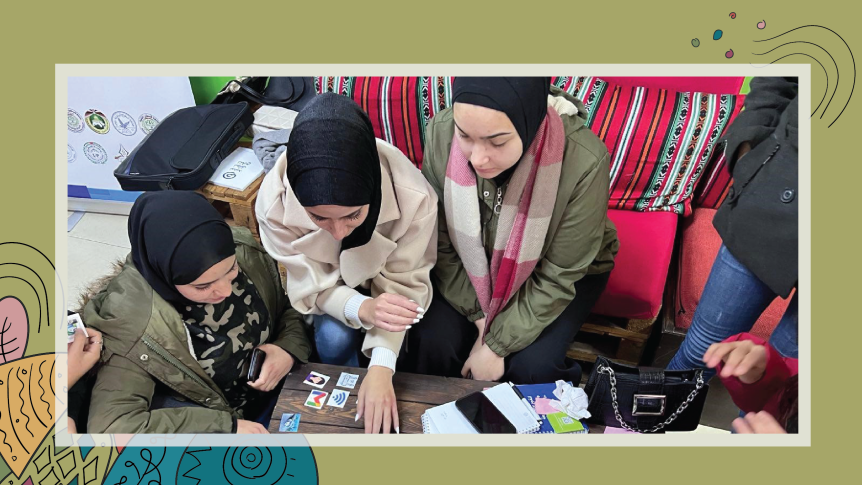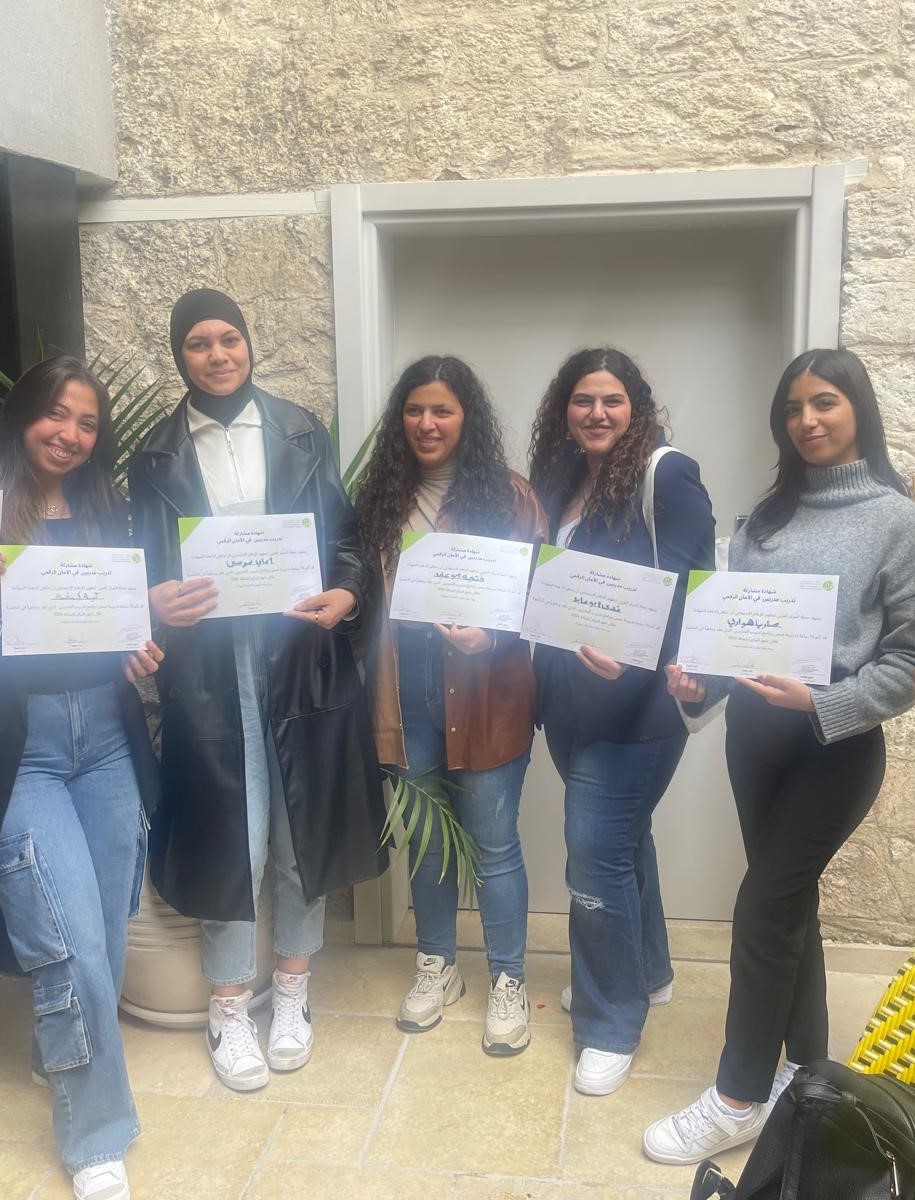
“As the war unfolded, I realised the importance of digital security for protecting our activism and staying safe online,” reflected a participant of a recent digital security training organised by 7amleh - The Arab Center for Social Media Advancement, APC’s Palestine-based member. “These skills are now indispensable for our community's resilience.”
The rapidly evolving digital landscape has significantly changed the way communities interact, exchange information and advocate for change, and this is particularly visible in conflict zones. These advancements also carry increasing threats and risks, especially for marginalised groups. In the case of Palestinian women and youth, navigating the online world has become particularly perilous amidst heightened political tensions and escalations from the Israeli war on Gaza.
Addressing these challenges, 7amleh launched the project “Resilience building through strengthening the digital protection of youth and women”, running from January to June 2024 to empower these communities through digital security trainings and awareness campaigns.
Rising digital threats amidst escalating violence
In the wake of the Israeli war on Gaza, digital rights violations have escalated significantly. Between 2022 and 2023, 7amleh notes there was a marked surge in digital rights violations; according to its 2023 Hashtag Palestine report, there were 4,400 incidents documented during that period, 69% of which occurred after the onset of the war on Gaza. In the 2024 report, the figures are equally appalling, with 75% of internet and communication infrastructure in Gaza partially or completely destroyed and media platforms continuing to restrict Palestinian content. These violations not only threaten personal safety but can also hinder the ability of activists, particularly women human rights defenders (WHRDs), to continue their work.
As physical violence often intersects with online threats, the need for digital security training became ever more urgent. The conflict has given rise to digital threats such as surveillance and censorship, and has left people increasingly vulnerable to online attacks, which often carry over beyond the digital realm. These violations pose significant risks to the safety and well-being of individuals, especially WHRDs and youth who actively engage in online activism.
The project aimed to enhance the capacities of Palestinian women and youth through digital security trainings and a wide-reaching awareness campaign. The core objective was to equip participants with the necessary skills and knowledge to more safely navigate online spaces, particularly during times of crisis, political escalation and censorship. In doing so, the project served as both a preventative measure and a tool for building resilience in the face of increasing digital violations.

By providing holistic safety resources and training, the project focused on preventing online risks to which Palestinians, particularly WHRDs, are regularly exposed. The trainings emphasised how to recognise and address digital threats before they escalate into full-blown security crises. They also ensured that WHRDs received critical resources to protect themselves during moments of acute risk and conflict. Through the creation of support networks and the implementation of inclusive policies, the project aimed to build capacity of WHRDs, fostering a stronger foundation for their activism and advocacy efforts.
Tailored approaches to building digital security
The project was designed around three key activities: digital security trainings for women and youth as well as a comprehensive digital rights/security awareness campaign. One of the most impactful components of the project was the digital security training provided to Palestinian women, primarily from human rights organisations. A three-day training session was organised for 21 women, focusing on empowering the participants with tools and knowledge to protect themselves from digital threats such as online surveillance and mitigating online gender-based violence. The decision to hold a women-only training, led by a woman trainer, was especially important for creating a safe space where participants could freely discuss the unique challenges they face online, including the risk of gender-based violence and harassment. The impact of the training proved to be significant, with a follow-up evaluation indicating that 86% of participants responded that their knowledge of digital security had improved.
The digital security training organised for youth was another significant activity, as young people involved in activism are frequently targeted by digital threats and may not be aware of the risks they face or the resources available to them. The training was conducted in order to help youth build their knowledge and resilience in online spaces and took place over three days in Ramallah. In total, 35 youth (comprising 20 female and 15 male participants) engaged in the sessions, which focused on helping participants understand the risks they face online and provided practical tools for protecting their privacy and data. The evaluation showed that 91% of participants felt their understanding of digital security had improved, and an encouraging 82% felt more confident in protecting themselves on social platforms. “I now have the knowledge and can protect myself and my family from spying and hacking,” said one participant, underscoring the relevance and impact of the training.

To complement the training sessions, 7amleh launched an extensive awareness campaign on digital rights and security through its social media channels. The campaign aimed to raise awareness about the risks associated with online activity and provide guidance on how to mitigate these risks. It reached an impressive 583,248 people and promoted 7amleh's digital security helpdesk, which has since supported 65 cases of digital threats by offering preventive security tips and solutions to digital threats. The high levels of engagement throughout the campaign show a profound need for capacity building during times of crisis, when people are more vulnerable and communication is critical.

Enhancing safety and empowering advocacy
In the midst of a deeply challenging context, 7amleh’s project has shown how even small steps can have a meaningful impact on communities. Strengthening the safety of Palestinian women and youth through digital security helped them gain necessary skills to navigate online more safely and protect themselves from digital violations, which is imperative for continuing their advocacy efforts despite increased risks.
The approach is also highly replicable and adaptable by other organisations who are working in different contexts, and are looking to help equip marginalised groups with the skills and knowledge to protect themselves online.
For the participants in the digital security trainings, the project was particularly meaningful as it created an environment of mutual support. An inspiring manifestation of this was the creation of a safe space for women in the form of a Signal group, where they could continue to connect, build community, and share experiences and advice. These connections have not only empowered the participants but also contributed to the creation of a network of support, fostering solidarity among Palestinian activists and human rights defenders.

Overall, the project’s holistic approach to digital rights – combining hands-on training with a wider awareness campaign – has helped to build long-term resilience in the community. “During the war, our digital safety training was essential. It empowered us to navigate the online space amidst heightened risks and ensure our voices were heard despite the challenges,” one digital safety trainee noted. In a time of increasing digital threats and global turmoil, initiatives like these are indispensable in ensuring that the voices of marginalised communities are not silenced.
To learn more about 7amleh's work, visit their recently launched #ReconnectGaza campaign, calling on all stakeholders to advocate for the restoration of the basic right to communication for Gaza’s Palestinian residents.
This piece is a version of the information provided by 7amleh - The Arab Center for Social Media Advancement as part of the project "Resilience building through strengthening the digital protection of youth and women", adapted for the Seeding Change column. Did this story inspire you to plant seeds of change in your community? Share your story with us at communications@apc.org
Cover image: Photo courtesy of 7amleh